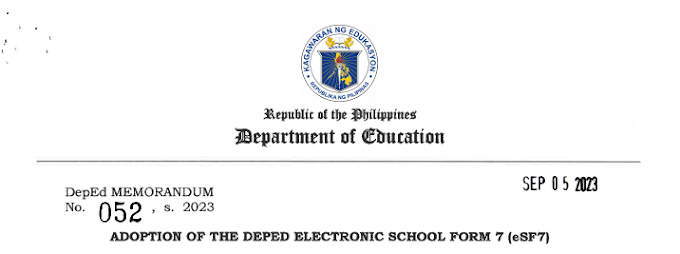The Department of Education (DepEd), upholding its mandate to holistically educate learners, has vowed to maintain academic honesty while upholding every learner’s integrity.
“DepEd does not and will not tolerate any form of academic dishonesty,” DepEd stressed.
DepEd Memorandum 2021-395, signed by Undersecretary for Curriculum and Instruction Diosdado M. San Antonio and sent to all the regional directors on September 20, cited the most recent controversy on cheating as publicized via Facebook.
Thus, the following were stressed and must be always underscored in all possible means:
1. Academic honesty—foundational element of learning and a fundamental principle of all academic institutions.
“Violations of the principle deprive learners of the opportunity to gain a confident command of the material they are credited with knowing, degrade the learning process, and demean the learning quality that the Department is committed to promote.”
2. Academic dishonesty—defined as any conduct that obstructs the evaluation of a learner’s progress by misrepresenting the work being assessed and evaluated, as well as the learner’s actual knowledge.
3. Academic dishonesty can take many forms, which can be broadly classified as cheating, plagiarism, fabrication or falsification, and sabotage.
The DepEd also stated that contract cheating is also prohibited for it is “another form of academic dishonesty,” which may happen in any of the following situations:
Unpaid assistance from friends or family members to complete the work in place of the learners
A paper that has been taken from a free essay web site and is being used as the learner’s own work
An academic assignment done for a fee by a third-party service
“As self-directed learning materials, the self-learning modules [SLMs] are given to learners to allow them to manage their learning through the different formative assessments. Although these are not graded and are used to monitor learning progress and prepare learners for summative assessments, cheating on the answers to the SLMs has become prevalent online,” DepEd stressed.
While the SLMs have key to correction, the DepEd said that as an inherent feature of self-instructional materials, “it is not intended to be used to cheat and bypass authentic learning. Regardless of the design of the SLMs and the extent of freedom in the online space, cheating cannot be justified under any circumstance.”
To eradicate this form of cheating, the regional offices are highly encouraged to take the following immediate actions to protect academic integrity and ensure the veracity of learners’ assessment results:
a. Conduct orientation with parents to raise awareness on the existence of FB pages that promote cheating, encourage their support against academic dishonesty, and explain the repercussions of cheating to the learning and values of their children.
b. Ensure proactive transparency of the assessment and grading system to parents and learners in order to promote understanding of the purpose of formative assessments in the SLMs.
c. Monitor the learner’s online activity and warn them against membership in any online cheating platform.
d. Encourage teachers to write up a contract about academic dishonesty and explain the contents to the learners and parents and have them both sign the contract. Then, if learners are caught cheating, the teacher can pull
out the contract and act accordingly.
e. Develop Self-learning Activities (SLAs) or the Learning Activity Sheets (LAS) that require learners to analyze information, craft creative presentations, or explain their thinking. These shall be validated by the School Division Office or School Learning Resource Team.
“The department recognizes the limitations of managing assessments in the current learning set-up; however, teachers, parents, and school heads are highly encouraged to seek out opportunities to teach academic integrity among learners and discourage them from feeding on laziness and instant gratification, as this will generate devastating effects on their values. Nonetheless, when dealing with academic dishonesty, teachers, parents, and school heads should use caution, exercise good judgment, and treat learners with respect and fairness.”






![SLMs for Quarter 1 - Quarter 4 - [Available for Download]](https://blogger.googleusercontent.com/img/b/R29vZ2xl/AVvXsEiZKSQtCDRXVs4RTJFjtMpR67iw_g9EVBBcK82LSyXQVwGPufhicWCrcXb14k_MCTa4r7C-E-d5OPXScHcX_4iNiuzpTnygCDce2EQqd3vYo1A2pB94_Ttpmukgx55G2ip8mfyi4T-wosE/w680/compressed.png)

0 Comments